财经英语视频文本
- 格式:doc
- 大小:49.50 KB
- 文档页数:9
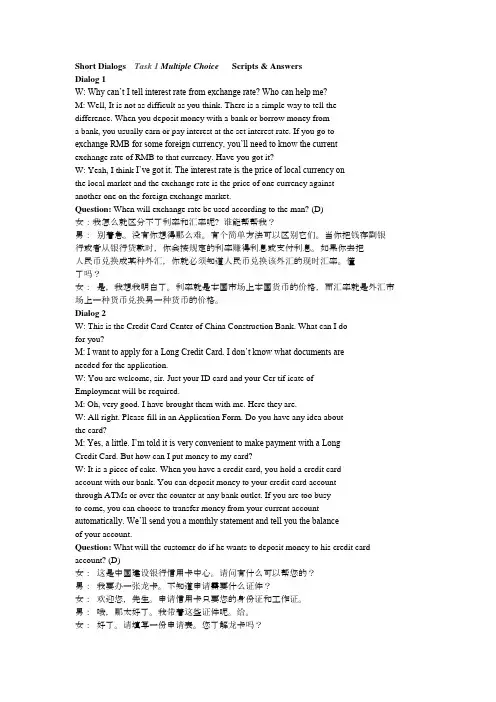
Short Dialogs Task 1 Multiple Choice Scripts & AnswersDialog 1W: Why can’t I tell interest rate from exchange rate? Who can help me?M: Well, It is not as difficult as you think. There is a simple way to tell the difference. When you deposit money with a bank or borrow money froma bank, you usually earn or pay interest at the set interest rate. If you go toexchange RMB for some foreign currency, you’ll need to know the currentexchange rate of RMB to that currency. Have you got it?W: Yeah, I think I’ve got it. The interest rate is the price of local currency onthe local market and the exchange rate is the price of one currency againstanother one on the foreign exchange market.Question: When will exchange rate be used according to the man? (D)女:我怎么就区分不了利率和汇率呢? 谁能帮帮我?男:别着急。
没有你想得那么难。
有个简单方法可以区别它们。
当你把钱存到银行或者仍银行贷款时,你会按规定的利率赚得利息或支付利息。
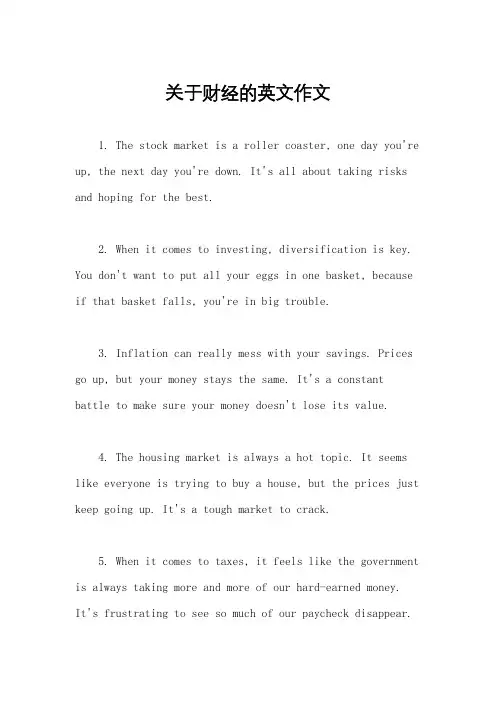
关于财经的英文作文1. The stock market is a roller coaster, one day you're up, the next day you're down. It's all about taking risks and hoping for the best.2. When it comes to investing, diversification is key. You don't want to put all your eggs in one basket, because if that basket falls, you're in big trouble.3. Inflation can really mess with your savings. Prices go up, but your money stays the same. It's a constantbattle to make sure your money doesn't lose its value.4. The housing market is always a hot topic. It seems like everyone is trying to buy a house, but the prices just keep going up. It's a tough market to crack.5. When it comes to taxes, it feels like the government is always taking more and more of our hard-earned money.It's frustrating to see so much of our paycheck disappear.6. The gig economy is changing the way we work and make money. With apps and websites offering freelance work, it's easier than ever to make some extra cash on the side.7. Cryptocurrency is the new kid on the block. It's a digital currency that's shaking up the financial world. Some people are making big bucks, while others are losing everything.8. The global economy is a complex web of trade deals and tariffs. It's hard to keep up with all the changes, but it definitely affects our daily lives.。
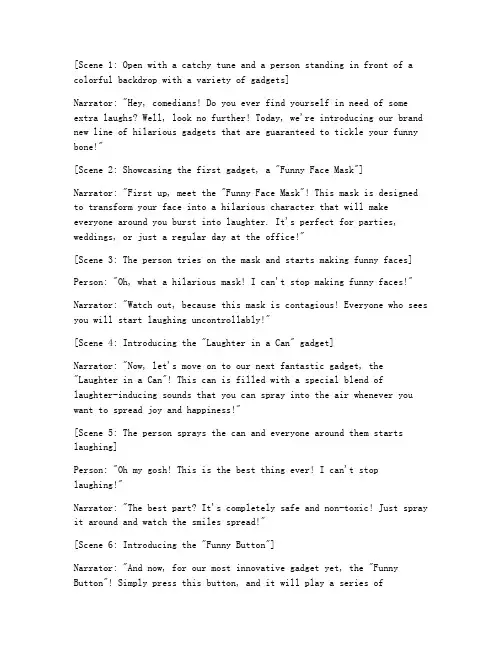
[Scene 1: Open with a catchy tune and a person standing in front of a colorful backdrop with a variety of gadgets]Narrator: "Hey, comedians! Do you ever find yourself in need of some extra laughs? Well, look no further! Today, we're introducing our brand new line of hilarious gadgets that are guaranteed to tickle your funny bone!"[Scene 2: Showcasing the first gadget, a "Funny Face Mask"]Narrator: "First up, meet the "Funny Face Mask"! This mask is designed to transform your face into a hilarious character that will make everyone around you burst into laughter. It's perfect for parties, weddings, or just a regular day at the office!"[Scene 3: The person tries on the mask and starts making funny faces]Person: "Oh, what a hilarious mask! I can't stop making funny faces!"Narrator: "Watch out, because this mask is contagious! Everyone who sees you will start laughing uncontrollably!"[Scene 4: Introducing the "Laughter in a Can" gadget]Narrator: "Now, let's move on to our next fantastic gadget, the "Laughter in a Can"! This can is filled with a special blend oflaughter-inducing sounds that you can spray into the air whenever you want to spread joy and happiness!"[Scene 5: The person sprays the can and everyone around them starts laughing]Person: "Oh my gosh! This is the best thing ever! I can't stoplaughing!"Narrator: "The best part? It's completely safe and non-toxic! Just spray it around and watch the smiles spread!"[Scene 6: Introducing the "Funny Button"]Narrator: "And now, for our most innovative gadget yet, the "Funny Button"! Simply press this button, and it will play a series ofhilarious sound effects that will make anyone who hears them burst into laughter!"[Scene 7: The person presses the button and a series of sound effects play]Person: "Oh my goodness! This is the funniest thing ever! I can't stop laughing!"Narrator: "The "Funny Button" is perfect for use at home, in the office, or even in the car! Just press it whenever you want to bring some laughter into your life!"[Scene 8: Introducing the "Hilarious Pen"]Narrator: "Finally, meet the "Hilarious Pen"! This pen is not only great for writing but also has a built-in button that, when pressed, will make your pen write in hilarious, comical fonts that will make everyone who reads your notes burst into laughter!"[Scene 9: The person writes with the pen and shows off the comical fonts]Person: "Wow! This pen is amazing! I can't wait to use it to write funny notes to my friends!"Narrator: "The "Hilarious Pen" is the perfect gift for anyone who loves to make people laugh! Whether it's a colleague, friend, or family member, they'll be sure to appreciate this unique and fun gift!"[Scene 10: The person gives the pen to a friend and they both laugh]Friend: "Oh my gosh! This pen is hilarious! Thank you so much!"Person: "You're welcome! I knew you'd love it!"[Scene 11: The narrator wraps up the video]Narrator: "So, what are you waiting for? If you're ready to unleash your inner comedian and bring laughter into your life, be sure to check out our hilarious gadgets! They're guaranteed to make you and everyone around you laugh out loud!"[Scene 12: The person waves goodbye and the screen fades to black]Narrator: "Don't forget to like, comment, and share this video with your friends! And don't miss out on our exclusive discount code:'HILARIOUS10' for 10% off your purchase! Stay hilarious, and we'll see you next time!"[End with the company logo and contact information]。
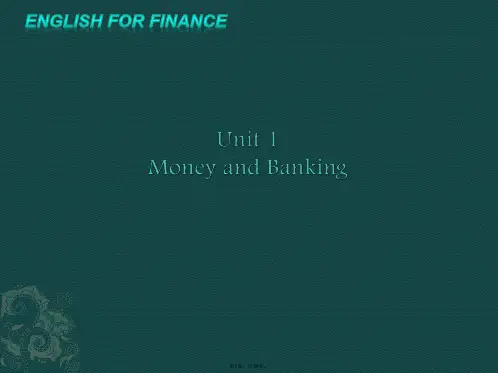
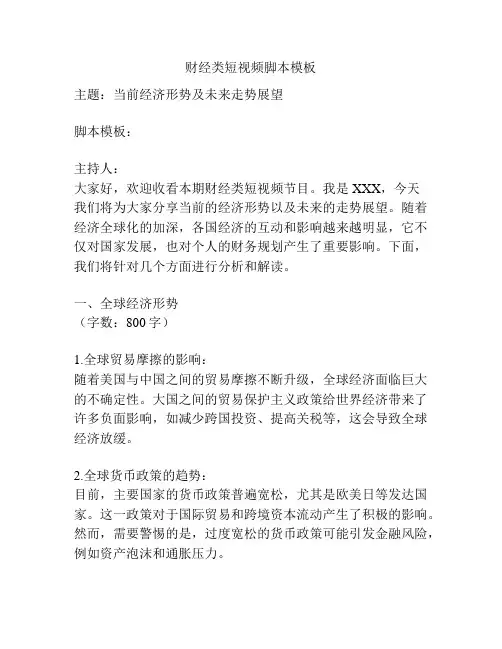
财经类短视频脚本模板主题:当前经济形势及未来走势展望脚本模板:主持人:大家好,欢迎收看本期财经类短视频节目。
我是XXX,今天我们将为大家分享当前的经济形势以及未来的走势展望。
随着经济全球化的加深,各国经济的互动和影响越来越明显,它不仅对国家发展,也对个人的财务规划产生了重要影响。
下面,我们将针对几个方面进行分析和解读。
一、全球经济形势(字数:800字)1.全球贸易摩擦的影响:随着美国与中国之间的贸易摩擦不断升级,全球经济面临巨大的不确定性。
大国之间的贸易保护主义政策给世界经济带来了许多负面影响,如减少跨国投资、提高关税等,这会导致全球经济放缓。
2.全球货币政策的趋势:目前,主要国家的货币政策普遍宽松,尤其是欧美日等发达国家。
这一政策对于国际贸易和跨境资本流动产生了积极的影响。
然而,需要警惕的是,过度宽松的货币政策可能引发金融风险,例如资产泡沫和通胀压力。
3.新兴市场的挑战:新兴市场国家面临许多挑战,例如经济增长放缓、金融风险增加、外债问题等。
这些问题一方面对新兴市场国家自身的发展产生负面影响,另一方面也会通过全球化的溢出效应传导到发达国家。
二、中国经济形势(字数:1000字)1.经济增速的放缓:近年来,中国经济增速有所放缓,这一现象与经济结构转型和调整密切相关。
中国正在从传统的出口导向型经济向消费驱动型经济转型,这是经济可持续发展的必然趋势。
同时,中国政府也采取了一系列措施来稳定经济增速,如适度扩大内需、降低企业税负等。
2.结构性改革的挑战:中国经济在转型过程中面临着一些结构性改革的挑战。
例如,国有企业改革、环境保护、金融体系改革等都需要推动。
这些改革对于提高中国经济的竞争力和可持续发展至关重要。
3.区域经济发展的机遇:中国积极推动一带一路倡议,加强与世界各国的经贸合作。
这为中国提供了更多的市场机遇和合作空间,也为中国经济走向全球化提供了有力支撑。
三、个人财务规划建议(字数:1500字)1.理性投资:针对当前经济形势,我们建议个人在投资时保持冷静客观的心态,根据自身的风险承受能力和投资目标制定合理的投资策略。

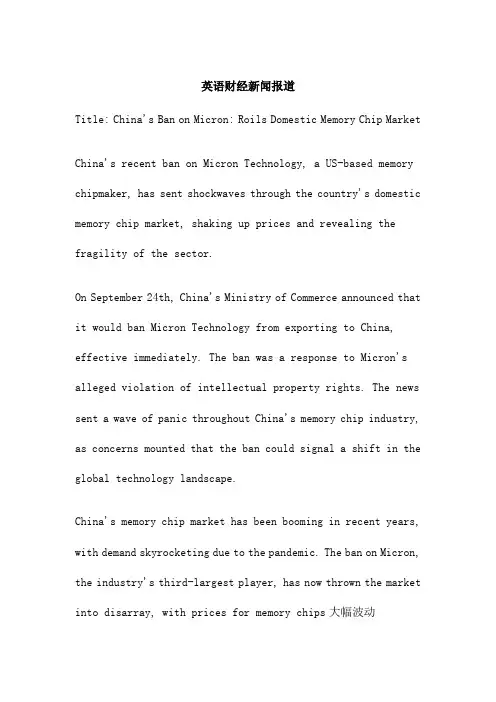
英语财经新闻报道Title: China's Ban on Micron: Roils Domestic Memory Chip Market China's recent ban on Micron Technology, a US-based memory chipmaker, has sent shockwaves through the country's domestic memory chip market, shaking up prices and revealing the fragility of the sector.On September 24th, China's Ministry of Commerce announced that it would ban Micron Technology from exporting to China, effective immediately. The ban was a response to Micron's alleged violation of intellectual property rights. The news sent a wave of panic throughout China's memory chip industry, as concerns mounted that the ban could signal a shift in the global technology landscape.China's memory chip market has been booming in recent years, with demand skyrocketing due to the pandemic. The ban on Micron, the industry's third-largest player, has now thrown the market into disarray, with prices for memory chips大幅波动(fluctuating significantly)."The Micron ban is a double-edged sword," said Zhang Xiaohui, an analyst at Gavekal Dragonomics. "While it may help to reduce distortions caused by upstream price spikes, it could also lead to supply chain disruptions and force China to rely more on unreliable suppliers."The ban has also highlighted China's reliance on imported memory chips. According to industry insiders, China imported over $20 billion worth of memory chips last year, with a significant portion coming from the US."This ban is a wake-up call for China to reduce its reliance on imported chips," said Li Qing, a technology analyst at Nomura. "The government needs to encourage more domestic innovation and support the development of a local chip industry."The ban on Micron has also cast a spotlight on Zhongwang Group, a Chinese aluminum giant that was once the world's largest producer of primary aluminum. Zhongwang Group has been looking to diversify its business and has been actively investing inthe semiconductor industry."The Micron ban could present opportunities for Zhongwang Group and other Chinese companies looking to break into the memory chip market," sd Wu Xiaoling, a financial analyst at UBS. "However, given the complexity of the semiconductor industry, success will not come easily."With China's ban on Micron in place, the country's memory chip industry now faces an uncertn future. As prices fluctuate and concerns mount about supply chn reliability, the industry will need to brace for further challenges in the months ahead.随着全球经济的发展,财经新闻报道在信息传递和决策参考方面发挥着越来越重要的作用。
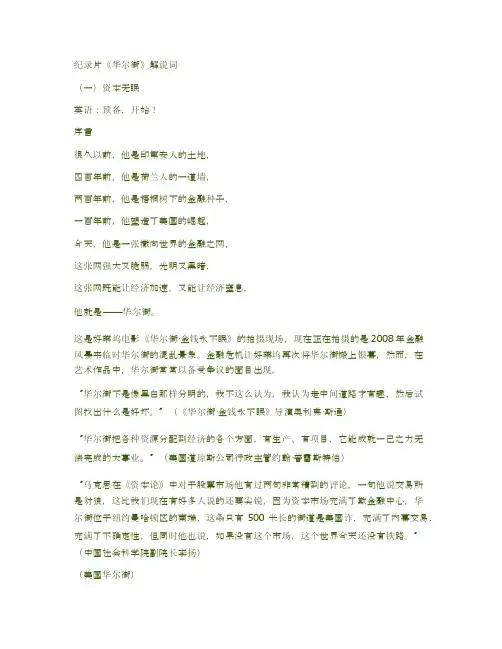
纪录片《华尔街》解说词(一)资本无眠英语:预备,开始!序言很久以前,他是印第安人的土地,四百年前,他是荷兰人的一道墙,两百年前,他是梧桐树下的金融种子,一百年前,他塑造了美国的崛起,今天,他是一张撒向世界的金融之网,这张网强大又脆弱,光明又黑暗,这张网既能让经济加速,又能让经济窒息,他就是——华尔街。
这是好莱坞电影《华尔街·金钱永不眠》的拍摄现场,现在正在拍摄的是2008年金融风暴来临时华尔街的混乱景象。
金融危机让好莱坞再次将华尔街搬上银幕,然而,在艺术作品中,华尔街常常以备受争议的面目出现。
“华尔街不是像黑白那样分明的,我不这么认为,我认为走中间道路才有趣,然后试图找出什么是好坏。
”(《华尔街·金钱永不眠》导演奥利弗·斯通)“华尔街把各种资源分配到经济的各个方面,有生产、有项目,它能成就一己之力无法完成的大事业。
”(美国道琼斯公司行政主管约翰·普雷斯特伯)“马克思在《资本论》中对于股票市场他有过两句非常精到的评论,一句他说交易所是豺狼,这比我们现在有好多人说的还要尖锐,因为资本市场充满了欺金融中心,华尔街位于纽约曼哈顿区的南端,这条只有500米长的街道是美国诈,充满了内幕交易,充满了不确定性,但同时他也说,如果没有这个市场,这个世界今天还没有铁路。
”(中国社会科学院副院长李扬)(美国华尔街)英语:投资者们知道了令人震惊的消息,华尔街两家最有名的投资银行即将消失,昨天雷曼准备宣布破产计划。
2008年金融危机显示了华尔街的巨大破坏力,这不仅让美国家庭的总财富平均损失了四分之一,而且让全球经济处于最严重的衰退中。
然而,近200年来的历史证明,华尔街创造出的财富远远超过它对财富的破坏。
第一集资本无眠纽约,这个坐落于美国东海岸的国际大都会,一直是世界上最重要的商业和资本市场和经济实力的象征,它影响和牵动着全球资本市场和全球经济。
英语:你好马克,海外市场如何?好的,这是我们所预料的,今天一定是涨跌无常的一天。
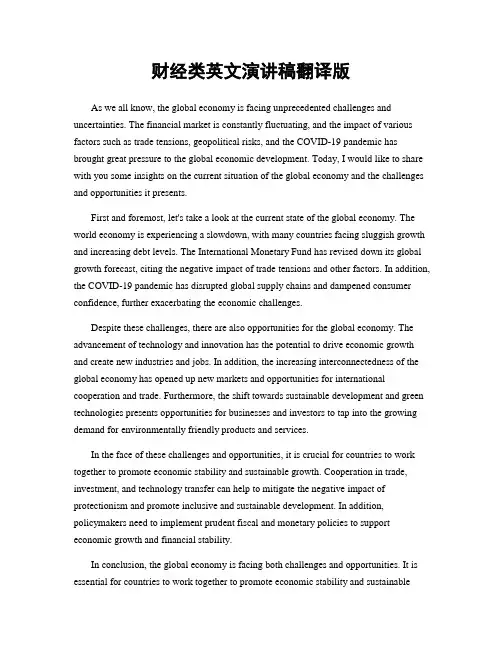
财经类英文演讲稿翻译版As we all know, the global economy is facing unprecedented challenges and uncertainties. The financial market is constantly fluctuating, and the impact of various factors such as trade tensions, geopolitical risks, and the COVID-19 pandemic has brought great pressure to the global economic development. Today, I would like to share with you some insights on the current situation of the global economy and the challenges and opportunities it presents.First and foremost, let's take a look at the current state of the global economy. The world economy is experiencing a slowdown, with many countries facing sluggish growth and increasing debt levels. The International Monetary Fund has revised down its global growth forecast, citing the negative impact of trade tensions and other factors. In addition, the COVID-19 pandemic has disrupted global supply chains and dampened consumer confidence, further exacerbating the economic challenges.Despite these challenges, there are also opportunities for the global economy. The advancement of technology and innovation has the potential to drive economic growth and create new industries and jobs. In addition, the increasing interconnectedness of the global economy has opened up new markets and opportunities for international cooperation and trade. Furthermore, the shift towards sustainable development and green technologies presents opportunities for businesses and investors to tap into the growing demand for environmentally friendly products and services.In the face of these challenges and opportunities, it is crucial for countries to work together to promote economic stability and sustainable growth. Cooperation in trade, investment, and technology transfer can help to mitigate the negative impact of protectionism and promote inclusive and sustainable development. In addition, policymakers need to implement prudent fiscal and monetary policies to support economic growth and financial stability.In conclusion, the global economy is facing both challenges and opportunities. It is essential for countries to work together to promote economic stability and sustainablegrowth. By addressing the current challenges and seizing the opportunities presented by technological advancement and sustainable development, we can build a more resilient and inclusive global economy for the future. Thank you.。
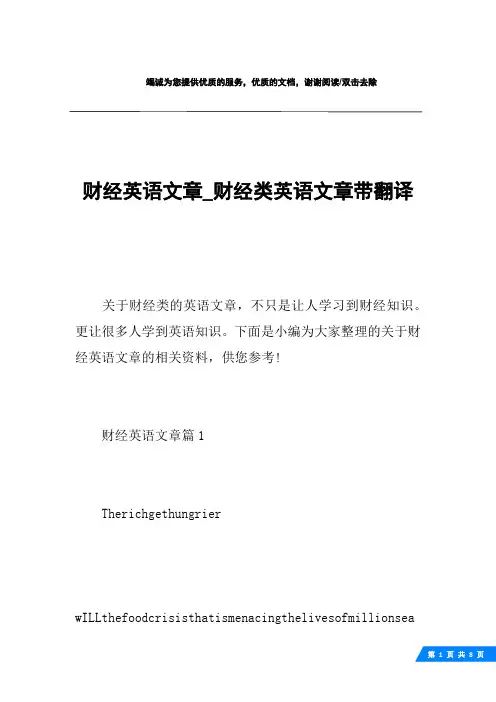
竭诚为您提供优质的服务,优质的文档,谢谢阅读/双击去除财经英语文章_财经类英语文章带翻译关于财经类的英语文章,不只是让人学习到财经知识。
更让很多人学到英语知识。
下面是小编为大家整理的关于财经英语文章的相关资料,供您参考!财经英语文章篇1Therichgethungrier wILLthefoodcrisisthatismenacingthelivesofmillionseaseup—orgrowworseovertime?Theanswermaybeboth.Therecentris einfoodpriceshaslargelybeencausedbytemporaryproblem slikedroughtinAustralia,ukraineandelsewhere.Thought heneedforhugerescueoperationsisurgent,thepresentacu tecrisiswilleventuallyend.butunderlyingitisabasicpr oblemthatwillonlyintensifyunlesswerecognizeitandtry toremedyit.Itisataleoftwopeoples.Inoneversionofthestory,acount rywithalotofpoorpeoplesuddenlyexperiencesfasteconom icexpansion,butonlyhalfofthepeopleshareinthenewpros perity.Thefavoredonesspendalotoftheirnewincomeonfoo d,andunlesssupplyexpandsveryquickly,pricesshootup.T herestofthepoornowfacehigherfoodpricesbutnogreateri ncome,andbegintostarve.Tragedieslikethishappenrepea tedlyintheworld.财经英语文章篇2Developedanddevelopingcountrieswitnesseddifferentra tesofgrowthinmobile-phonesubscriptionfrom2000to20XX .Asthebargraphshows,thenumberofmobile-phonesub-scri bersindevelopedcountriesrosesteadily(稳步增长)from0.7billionin2000toonebillionin20XX.bystarkco ntrast(突出对比),cellphoneusersindevelopingcountriessoaredfrom0. 4billionto4billioninthesameperiod.whataccountsforthisdisparity(差距,不同)?Theanswerinvolvestwofactors.Thefirstreasonistec hnologygap.Developedcountriesgenerallyenjoyadvanced technology,whichenablesthemtopopularizemobilephonea headofdevelopingcountries.Anothercontributingfactor isthedifferenceinpopulationsize.Asweknow,developedc ountriesusuallyhaveasmallpopulationbutmostdevelopin gcountriesalarge.Asthepriceofthemobilephoneslides(下滑),moreandmorepeopleindevelopingcountriesavailthem selvesof(利用)thisservice,whichexplainsthesubstantialincrease(大幅增长)inmobile-phonesubscriptioninthesecountriessince2 0XX.Fromthecaseofmobile-phonesubscription,weseethatdeve lopingcountriesarequicklycatchingup(赶追)inscienceandtechnology,whichisbelievedtobeconduc ivetoclosingthegapbetweendevelopinganddevelopedcoun tries.财经英语文章篇3china'scurrency"isnolongerundervalued",accordingtot heInternationalmonetaryFund(ImF).国际货币基金组织认为,人民币币值已不再被低估。
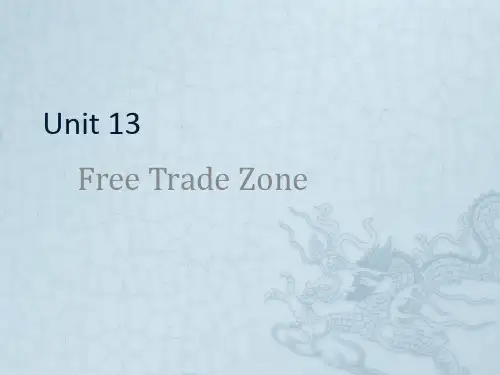
️ "Hey fashion enthusiasts, are you ready to revamp your wardrobe with the latest trends? Look no further! Today, we're introducing our newest collection that's set to take your style game to the next level. Get ready to shop and explore the perfect pieces that will make you stand out from the crowd!"️ " ️ Men's Edition: The Timeless Elegance Meets Modern Fashion"️ "Introducing our men's collection, where classic meets contemporary. From sleek suits to statement tees, each piece is crafted with precision to ensure you look sharp and feel confident. Whether you're heading to the office or a casual outing, our collection has got you covered. Let's dive into the details!"️ "1. The Power Suit: Elevate Your Office Attire"️ "The Power Suit is a must-have for the modern professional. With its tailored fit and timeless design, it's perfect for those important meetings or a day at the office. Available in various colors and styles, you can choose the one that suits your personality and work environment."️ "2. The Casual Crew: Comfort Meets Style"️ "For those days when you want to look good but feel relaxed, our Casual Crew is the answer. These comfortable yet stylish tees and hoodies are perfect for a laid-back weekend or a casual hangout with friends. With vibrant colors and bold prints, you'll stand out in any crowd."️ "3. The statement Tee: Express Your Personality"️ "Let your style speak for itself with our statement tees. These unique designs are a blend of humor, pop culture, and artistic flair. Whether you're into music, art, or just love a good laugh, there's a tee that will resonate with your sense of humor."️ " ️ Women's Edition: Embrace Your Femininity with Flair"️ "For the women who want to embrace their femininity and express themselves through fashion, our women's collection is a celebration of style and comfort. From chic dresses to trendy jeans, discover the pieces that will make you feel like a fashion icon."️ "1. The Little Black Dress: The Ultimate Classic"️ "Every woman's wardrobe needs a little black dress. This timeless piece is versatile, elegant, and can be dressed up or down depending on the occasion. Our collection features a range of LBDs that will complement your figure and add a touch of sophistication to any outfit."️ "2. The Denim Dream: The Ultimate Comfort and Style"️ "Denim is a staple in every woman's wardrobe, and our collection has got you covered. From high-waisted jeans to relaxed-fit trousers, our denim pieces are designed to flatter your curves and provide theultimate comfort. Mix and match with our stylish tops and accessoriesfor a complete look."️ "3. The Floral Fiesta: Add a Pop of Color"️ "Floral prints are making a big comeback, and our collection features a variety of floral dresses and tops that will add a burst of color to your wardrobe. Whether you're going to a spring event or just want to add a touch of whimsy to your everyday look, our floral pieces are the perfect choice."️ " ️ Kids' Edition: Fashion for the Little Ones"️ "Fashion isn't just for adults – our kids' collection is designed to make little ones look adorable and feel comfortable. From playful graphic tees to trendy denim, our kids' wear is stylish yet durable, ensuring your little ones can move and play with ease."️ "1. The Graphic Tee: Fun and Edgy"️ "Let your child's personality shine with our graphic tees. These fun and edgy designs are perfect for kids who love to express themselves.With a variety of themes, from animals to superheroes, there's something for every little one's taste."️ "2. The Denim Cutie: The Ultimate Kids' Denim"️ "Our denim collection for kids is designed to be both stylish and practical. From adorable denim overalls to trendy jeans, these piecesare made to withstand the playful antics of little ones while keeping them looking fashionable."️ "3. The Casual Charm: Comfortable and Adorable"️ "For those days when you want your child to look cute without compromising on comfort, our casual wear is the way to go. With soft fabrics and fun designs, these pieces will make your child feel cozy and look adorable all day long."️ "Don't miss out on our latest collection! Visit our website or headto your nearest store to find the perfect pieces for you and your family. Use code 'STYLETREND' at checkout for an exclusive discount. Let's redefine fashion together!"️ "Shop now and elevate your style! ️"️ "Remember, with our collection, you're not just buying clothes –you're investing in a lifestyle. Stay tuned for more updates, and don't forget to like, share, and subscribe for more fashion inspiration!"。
财经类英语文章关于财经类的英语文章,不只是让人学习到财经知识。
更让很多人学到英语知识。
下面是店铺为大家整理的关于财经类英语文章的相关资料,供您参考!财经类英语文章篇1Asian markets opened higher on Monday after China cut interest rates for the third time in six months over the weekend to spur growth.上周末,中国在半年内第三次降低利率。
在它的刺激下,周一亚洲股市高开。
China's central bank lowered its benchmark rate by 25 basis points to 5.1%, saying the move was aimed at boosting development.中国央行将其基准利率降至5.1%,降幅为25个基点,并表示这一举措是为了促进发展。
Besides the cut, the central bank also slashed the bank reserve requirement ratio in February and April.除了降息,央行还在二月和四月大幅削减了银行准备金率。
Japan's Nikkei 225 index was up 1.3% to 19,638.26 - leading the region's gains.亚洲股市中日本日经的市值涨幅最大,日经225指数上涨1.3%,达到19638.26点。
Shares in Mazda and Toyota were up 3.2% and 1.3% respectively after reports that the companies were in talks to expand their technology partnership for fuel-cell vehicles as car makers face rising costs to deal with stricter emissions regulations.为了应对更严格的排放标准,汽车制造商们的成本也会上升。
财经作文写作英文1. The stock market is a roller coaster ride, with prices constantly fluctuating and investors on the edge of their seats. It's a game of risk and reward, where fortunes can be made or lost in an instant. But behind the excitement and adrenaline, there is a complex web offactors that influence the market.2. Inflation is one such factor that can have a significant impact on the economy. When prices rise, the purchasing power of consumers decreases, leading to a decrease in demand for goods and services. This can slow down economic growth and affect the profitability of businesses. Central banks often use monetary policy tools, such as interest rate adjustments, to control inflation and stabilize the economy.3. Globalization has transformed the world economy, connecting countries and markets like never before. It has opened up new opportunities for trade and investment, butit has also increased competition and created challengesfor domestic industries. Companies now have to navigate through international regulations, cultural differences,and currency fluctuations to stay competitive in the global marketplace.4. Technology has revolutionized the way we do business. From online shopping to mobile payments, digitalinnovations have made transactions faster, more convenient, and more efficient. However, they have also disrupted traditional industries and led to job displacements. Therise of automation and artificial intelligence has raised concerns about the future of work and the need forreskilling and upskilling to adapt to the changing job market.5. Government policies play a crucial role in shaping the economy. Tax policies, for example, can incentivize or discourage certain behaviors. Lowering corporate taxes can stimulate investment and economic growth, while higher personal income taxes can reduce consumer spending. Similarly, regulations can promote competition and protectconsumers, but they can also create barriers to entry for small businesses and stifle innovation.6. Financial crises are a recurring theme in the global economy. From the Great Depression to the 2008 financial crisis, these events have had far-reaching consequences on businesses, governments, and individuals. They often expose weaknesses in the financial system, such as excessive risk-taking or inadequate regulation. Governments and central banks have to step in to stabilize the markets and prevent further damage.7. Sustainable development has become a pressing issue in recent years. As the world grapples with climate change and resource depletion, businesses are under increasing pressure to adopt environmentally friendly practices. This shift towards sustainability not only benefits the planet but also presents new business opportunities. Companiesthat embrace renewable energy, waste reduction, and ethical sourcing can attract environmentally conscious consumers and investors.8. The rise of cryptocurrencies has captured the attention of investors and regulators alike. Bitcoin, Ethereum, and other digital currencies offer the promise of decentralized and secure transactions, but they also come with risks and uncertainties. Regulators are still grappling with how to regulate this new asset class, balancing the need for investor protection with the potential for innovation and economic growth.9. The COVID-19 pandemic has had a profound impact on the global economy. Lockdowns and travel restrictions have disrupted supply chains, forced businesses to close, and caused mass unemployment. Governments around the world have implemented unprecedented fiscal and monetary stimulus measures to support businesses and individuals. The long-term economic consequences of the pandemic are still uncertain, but it has highlighted the importance of resilience and adaptability in the face of unexpected shocks.10. In conclusion, the world of finance and economicsis a complex and ever-changing landscape. From marketfluctuations to government policies, from technological advancements to global challenges, there are countless factors that shape the way we do business and manage our money. By staying informed and adaptable, individuals and businesses can navigate through these challenges and find opportunities for growth and success.。
【视频时长】:2分钟【视频背景音乐】:轻快激昂的背景音乐【视频画面】:1. 开场画面:快速切换全球金融地标,如纽约华尔街、伦敦金融城、香港中环等,背景音乐渐入高潮。
2. 中间画面:结合动画、图表、专家访谈等多种形式,展示财经领域的最新动态和趋势。
3. 结尾画面:邀请观众关注视频账号,获取更多财经资讯。
【视频文案】:(画面1:全球金融地标切换)【旁白】在全球化的大背景下,财经领域日新月异,财富的流向犹如潮水般变幻莫测。
今天,就让我们一起揭开财经新趋势的神秘面纱,解锁财富增长的密码!(画面2:财经新闻动画)【旁白】近年来,科技金融、绿色金融、数字经济等新兴领域蓬勃发展,为投资者提供了更多元的投资选择。
那么,哪些行业将引领下一轮财富浪潮呢?(画面3:图表展示)【专家1】(画面中出现专家1的特写)随着人工智能、大数据、云计算等技术的不断突破,智能制造行业将迎来黄金发展期。
我国政府也出台了一系列政策,支持智能制造产业发展。
【旁白】是的,智能制造行业正成为新的投资风口。
那么,我们该如何抓住这个机遇呢?(画面4:专家访谈)【专家2】(画面中出现专家2的特写)首先,关注具有技术创新能力的龙头企业。
其次,紧跟政策导向,关注国家重点支持的产业。
最后,保持敏锐的市场洞察能力,及时调整投资策略。
(画面5:图表展示)【旁白】除了智能制造,绿色金融也成为全球关注的焦点。
随着环保意识的不断提高,绿色产业将获得更多的政策支持和市场认可。
【专家3】(画面中出现专家3的特写)绿色金融的发展,不仅有助于推动产业升级,还能为企业带来新的增长点。
投资者可以关注环保、新能源、节能等领域的优质企业。
(画面6:财经新闻动画)【旁白】在数字经济时代,数据成为最具价值的资产。
大数据、云计算等技术的发展,为金融行业带来了无限可能。
【专家4】(画面中出现专家4的特写)数字货币、区块链等新兴技术正在改变传统金融业态。
投资者可以关注具备技术创新和业务拓展能力的金融科技公司。
INTRODUCING THE NEXT BIG THING IN SMART LIVING![Video opens with a dynamic and catchy tune playing in the background. The screen displays a countdown timer: "5...4...3...2...1..."][The countdown timer reaches zero, and the screen fades to black, then a bright white "Welcome to our store!" appears.][The camera zooms in on the product, highlighting its sleek design and innovative features.]"Hey everyone, welcome back to our channel! Today, we're thrilled to bring you an exclusive unboxing and review of the most revolutionary smart home device on the market – the [Product Name]!"[The host picks up the device and waves it in the camera, smiling excitedly.]"Let's dive right in and take a closer look at what makes this gadget stand out from the crowd."[The host holds the device steady as the camera zooms in on its various buttons, sensors, and interfaces.]"First off, let's talk about the build quality. The [Product Name] is crafted from premium materials, ensuring both durability and a stylish appearance. The [specific color or finish] finish is not only visually appealing but also resistant to fingerprints and scratches."[The host showcases the device in different lighting conditions, emphasizing its sleek design.]"Now, let's power it up and see what it's capable of. The [Product Name] is compatible with all major smart home ecosystems, including Amazon Alexa, Google Assistant, and Apple HomeKit. This means you can control it with your voice or through your smartphone, tablet, or computer."[The host demonstrates how to pair the device with various smart home systems and apps.]"One of the standout features of the [Product Name] is its advanced AI. It's equipped with a high-precision sensor that can detect and analyze your habits, preferences, and even your mood. Based on this data, it can automatically adjust your home environment to your liking."[The host uses the device to control various aspects of the room, suchas temperature, lighting, and even music, while explaining how the AI works.]"But that's not all! The [Product Name] also offers a range of safety features. It can detect smoke, carbon monoxide, and even leaks, sending immediate alerts to your smartphone so you can take action before it's too late."[The host simulates a safety alert, showing how the device works inreal-time.]"And for those of you who are environmentally conscious, the [Product Name] is energy-efficient and designed to reduce your carbon footprint. It's the perfect choice for a sustainable and eco-friendly home."[The host discusses the device's energy-saving capabilities and sustainability features.]"But wait, there's more! The [Product Name] also doubles as apersonal assistant, helping you with daily tasks, providing weather updates, and even ordering your groceries online. It's a one-stopsolution for all your smart home needs!"[The host showcases additional features and uses of the device, such as ordering items from online stores.]"In conclusion, the [Product Name] is a game-changer in the world of smart home technology. Its sleek design, advanced AI, and comprehensive range of features make it an essential addition to any modern household."[The host holds the device in front of the camera, highlighting its features.]"And the best part? You can get your hands on this amazing device today! Just head over to our store and use the promo code 'SMARTHOME20' at checkout to enjoy a 20% discount on your purchase."[The screen displays the store's website, promo code, and a call-to-action button.]"Don't miss out on this incredible opportunity to transform your home into a smart haven. Grab your [Product Name] now and experience the future of living!"[The host gives a thumbs-up and waves the device, then the screen fades to black with the store's logo and contact information displayed.][The catchy tune from the beginning of the video plays again, ending the video.]---Remember, this is a script for a video, and the actual content would need to be captured on camera, with the host engaging with the product, and potentially including customer testimonials or a live demonstration.。
【Top News】>Daughters more popular英媒:房价削中国重男风High property prices and economic development have begun to erode China's traditional preference for sons, leading to a rise in the number of Chinese parents who say they want a daughter, the Financial Times of London reported Tuesday. The conventional wisdom - that China is a land of unwanted girls - is being changed as urbanization erodes the advantage of having sons to work the fields and support parents in old age. Rising property prices are also driving the change because Chinese families must traditionally buy an apartment for a son before he marries. As a result, Internet chat groups have sprang up where women exchange advice on how to conceive girls.英国《金融时报》2日称,中国的高房价和经济发展开始削弱人们重男轻女的传统风气,越来越多的父母表示更喜欢女儿。
文章称,城市化削弱了有儿子的优势,如儿子可以下田劳作、养老送终,因此"养女多余"的传统思想正渐行渐远。
Chapter 1 Bookkeeping:This lesson will reveal the secret of accounting language. In the previous lessons, we are shown how to tell the business story using the balance sheet and income statement. You are now going to be shown how to enhance the story telling by using the T account. Everything is done the same way as in the last lesson except now the accounts within the balance sheet and income statement will be replaced by drawing a T account for each account. When a transaction occurs, the change in the affected accounts is shown using the T account. Here is the procedure: There are 3 steps whenever a transaction occurs: Step 1 is to determine which accounts are going to be affected; Step 2 is to determine whether the affected accounts are going to increase or decrease as a result of the transaction; Step 3 is to use this specific T account to indicate the increase or decrease in each account. In the previous lessons, we were shown how to complete steps 1 and 2. Now it'll be shown how to complete step 3. In order to use T accounts, the following must be memorized. Imagine the balance sheet and its two halves: from the center moving outside towards the outsides means to increase. From the outside moving inward towards the center means to decrease. With these rules, T accounts can now be used to show how an account increases or decreases a particular T account. If we want to show that a T account on the assets side is going to increase by 10, we'll write 10 on the left side of the T account. It's written on the left side because the left side is on the increase side. If we want to show a T account on the liabilities side is going to increase by 10, we'll write 10 on the right side of the T account. It's written on the right side because the right side is on the increase side. Now if we want to show a specific asset account is to decrease by 5, we will write 5 on the right side of the T. It's written on the right side because the right side is on the decrease side. If we want to show an equity account is to decrease by 5, we will write 5 on the left side of the T. It's written on the left side because the left side is on the decrease side.Now what about the income statement? The income statement follows the same rules. Imagine the income statement is a part of the equity section of the balance sheet. Therefore, the income statement increases as you move from left to right just as the right side of the balance sheet does. Any number on the left side of the T account that is in the income statement will decrease net income. Any number on theright side of the T account on the income statement will increase income. If we want to show a revenue of 10 on the income statement, we will write 10 on the right side of the revenue T account. It's written on the right side because the right side is on the increase side. If we want to show an expense of 5, we will write 5 on the left side of the expense T account. It's written on the left side because the left side is on the decrease side.So as a review, the following must be memorized to use T accounts. From the center moving outward means increase; from outside of the balance sheet moving towards the middle means decrease. The income statement increases from left to right. To increase or decrease a T account, you must write a number on the left or right side of the T depending on where the account is on the balance sheet or the income statement.Once again, there are 3 steps to use the T account to tell the story of a business whenever a transaction occurs. Step 1 is to determine which accounts are going to be affected; Step 2 is to determine whether the affected accounts are going to increase or decrease as a result of the transaction; Step 3 is to use this specific T account to indicate the increase or decrease in each account.Finally here is the secret of accounting. Memorize the secret. Simply replace the word left with debit and right with credit. Forget everything you know about these words debit and credit and simply see them as meaning left and right. Notice the following examples. If we want to increase the asset account by 10, we put a debit of 10, debit means left, the left side means increase for this account. If we want to increase the liability account by 10, we put a credit of 10, credit means right, the right side means increase for this account. If we want to decrease the asset account by 10, we put a credit of 10, credit means right, the right side means decrease for this account. If we want to decrease the equity account by 10, we put a debit of 10, debit means left, the left side means decrease for this account. If we want to increase the revenue account by 10, we put a credit of 10, credit means right, the right side means increase for this account. If we want to decrease income by 5 by adding to an expense account, we put a debit of 5, debit means left, the left side means decreasing income. So to review this secret,left means debit, right means credit. You must not try to associate any other meanings to the words debit and credit. Don't thinkof debit cards at a bank or credit to your grade. Only think of them as meaning left and right. If you keep all the rules in mind, using T account to tell the story of a business becomes very simple. It just requires practice like any other language learning does.Chapter 2Let’s start to discuss financial accounting with a definition. Financial accounting is a process of three things: identifying, measuring, and communicating economic information to permit informed decisions by users of that information. Now I have italicized informed decision in that definition because I want to draw your attention to that. The purpose of accounting is not to confuse, not to obfuscate, not to mislead. The purpose of accounting, financial accounting is to permit informed decisions. Accounting is simply capturing and communicating economic activity that has occurred for an entity, whether that entity be a business, a governmental entity, any type of business. We want to inform you of that information. So we must do the three things in the definition. We must identify economic information that needs to be reported; we must measure that economic data or that economic phenomena or activity or transactions in order to capture it for disclosure; then we must communicate that information to interested parties. This can be very difficult.First of all, it can be difficult to identify transactions that occur within an entity. And then it can be very difficult to measure the impact or a transaction that has occurred. Again, the economic activity can be extremely complicated. And it can be difficult to measure accurately and well and meaningfully that economic transaction. Then it can be difficult to communicate that information in a manner that makes sense to those who have some accounting knowledge but are not trained as accountants. So we have to make sure that we communicate in a manner that allows users to become informed about an entity.In particular, financial accounting has three objectives. That is to identify, measure, and communicate information, accounting information, we want to make three objectives. The first objective is that we want to make that information to be useful in making investment and credit decisions. That makes sense if an entity wants to raise money by issuing stocks to investors. Then we need information to allow those investors to make decisions about their investment. Do you want to invest in a company? Well, you might want to look at their earnings. You might lookat their balance sheet. Perhaps you are interested in receiving dividends on your investment. You would look at their dividend payout over the last few years compared to their earnings. Whatever the investment decision is, you want to provide information useful in making that decision. Credit decision is the same way. Companies borrow money all the time. As we’ll see a little bit later, a company’s assets are either generated by investment or liabilities by creditors. So what do you want to know if you are making a credit decision? Well, can they pay the money back? So you might look at their earnings again. Or you might look at their current interest expense to see if they have a lot of interest expense that they may not be able to pay extra interest expense. You might look at their levels of liabilities in order to determine what interest you might charge—the riskier the company, the higher the interest rate. So the information from the accounting standpoint is supposed to help you make those investment and credit decisions in an entity.The second objective is that we want to have information that is useful in assessing the amount, timing, and uncertainty of future cash flows. Now, accounting is all about giving an indication about cash flows. Sometimes, accounting is criticized because those earnings are not in a cash basis, a lot of noncash items in a company’s net income. So, you can not equate net income with net cash inflow. That’s ok. The ultimate goal is, we’ll see this later in these foundations and in this accounting course. What accounting tries to do is to give an indication and understanding of the amount, timing, and uncertainty of future cash flows because ultimately if a company can not generate cash, then it can not stay in business regardless of what its accounting says. So we are trying to provide that information. As you begin to understand accounting, I believe you’ll begin to understand how we meet that objective in providing information for cash flows.Now a third objective of financial accounting is to provide information that you can use to assess a company’s resources, claims against those resources, and changes in them. Well, a company is no more than resources and claims against those resources. When we say we work for a public company like coke cola, what is coke cola other than what we call an academia, an nixes of contracts, a group of people that are working for a common cause for entities that own certain assets, well, the investors, the owners own those, but they use them and claim against those assets by the owners and the creditors. So a company is really nothing more than its resources and claims against those resources by the investors and creditors. So we certainly want to make sure thatyou can understand those resources and those claims against them and how they change over time. That is why you see in any financial statement at least two years of data so that you can calculate changes in a company’s resources and claims against them.Now in order to meet those three objectives, to provide information useful in investment and credit decisions, to help you understand cash flows, and to help you understand a company’s resources and claims against them, financial accounting or companies using financial accounting to produce full financial statements, these financial statements are as follows: balance sheet, income statement, statement of cash flows and statement of stockholders’ equity. those are the four major financial statements that all publicly traded companies and all companies in general that are owned by stockholders or owned by owners will have to get to their users or interested parties so that they can understand what happens or what has happened for a company. In addition to those four financial statements, you’ll also see for publicly traded companies footnotes to those statements and what we have here in MD&A, management discussion and analysis. The footnotes are additional explanations or additional disclosures beyond the financial statements. Management discussion and analysis is just what it sounds like, a discussion and analysis of the financial statements. So these four financial statements and MD&A and footnotes provide this information for investment, credit decisions, cash flows, and resources and claims against them. What we’ll do in this segment in the futu re in this material is look at each of these four financial statements. We won’t spend much time on footnotes and MD&A because they are beyond the scope of these foundation materials. But we’ll learn how to read each of those four financial statements.So financial accounting is the process of identifying, measuring, and communicating economic information through the four financial statements to permit investment, credit decisions, understanding of cash flows, and understanding of a company’s resources. Th at is what financial accounting is and hopefully you’ll see its benefits as we move through these materials. (Summary)Chapter 3 When financial statements lie(Focus on cash flows)Many people concentrate on growing sales and having good profits on the financial statements, because after all, profit is the numbereverybody was eyeing on, that is the number the analysts for publicly traded companies were looking. But a company could be growing too fast, and even though on the book … is showing some handso me profit, but the company could be forced [into] bankruptcy, if the sales that they made were on credit. They don’t collect money upfront. The accounting, financial statement will record that as sales as it occurs, whether the money has been collected fro m the customers; if it’s not, it will be account receivable on the balance sheet. So the accounts receivable, if they are not collected very quickly, for example, it takes you 60 days to collect that from your customers, but you have to pay your supplier in 30 days, you’ll have to your labor, you have to pay your production costs, everything sooner than you collect your money from your customers. At the same time, if there is a credit crunch, when banks are not going to lend you money to help you go through this transition period, you might be forced into bankruptcy even though your books can look very impressive and have some handsome profits.Chapter 4:Transcript to interview with Carson BlockI-Interviewer B-Carson BlockI: when you look at Chinese companies, what are the red flags?B: well, you can have different categories of red flags. Some companies, in a way, fake transparency. So their filings are chock full of information, but it is just the wrong kind of information, it’s information that…it’s n ot really what we call crunchy, that you can sink your teeth into. So, you have to look for key information. So if they don’t tell you who their customers are, if they don’t give you that much information on their suppliers, but it’s just a lot of general information about the way the industry works, and other places, that’s a red flag.I: now why should investors trust you, when you are shorting the stock, to be telling the truth about these companies?B: well, for one thing, I don’t know of any NGOs or charities that are doing equity research. Everybody has a stake in the game somehow. Now, the traditional model of equity research is investment banking married to equity research, the conflicts there are similar to my conflicts except the banks, are incentivized to be positive on those companies.I: why is it that some guy with a small team in China has caught fraud and problems with Chinese companies that the big-time auditors had missed?B: well, auditors are not historically looking for business frauds, they might be looking for aggressive accounting, maybe even looking foraccounting fraud, but they are not trained to look for situations in which 90% of the business actually does not exist. So they are looking at pieces of paper. And I think in a lot of cases, with China in particular, they are looking to make sure that the PRC GAAP is correctly translated in US or IFRS, as opposed to looking at the factory, making sure the factory production numbers are correctly translated into any financial statement.I: let’s talk for a second about the very very big picture for these companies you found problems with. Where does the blame really lie? Is it the company’s fault? Is it their auditor’s fault? Is it greedy stockholders in the US who are desperate to find good returns and are not doing their homework? Is it regulators? Who is really to blame for these problems? B: well, obviously, the person who is committing the fraud deserves the most blame. Secondarily, I think that there is a problem with the professional services sector that brings these companies to market—the bankers, the analysts, the lawyers, and the accountants, because right now the way it is set up is, …it’s like a hot potato of blame, they can all throw the hot potato to somebody else, and say “that company, or that role should have caught the fraud.” But at the end of the day, it seems like it is nobody’s responsibility.And that’s a problem.Chapter 5:Analysis: Media React to Facebook IPO Thinking about investing in Facebook? You may want to reconsider. The company has filed its IPO, but …It will still be a few months before Facebook stock hits the open market. And so far, many in the media don’t like what they see. CNET reports.“… how much growth potential is there in a company that already has 845 million users, per its filing? I don't doubt the company will be successful for a long time, but I suspect the days of hockey-stick growth are over. A wise man tells me often that you only make money by not doing what everyone else is doing.Even if I could invest in Facebook, something tells me it would only disappoint.”According to Facebook’s SEC filings, 85 percent of the company’s revenue comes from ad sales. On WebProNews, an analyst points out – some of those numbers are troubling investors.“They have 845 million average monthly average users. Of that, 450million are mobile users. The thing is –right now they don’t have any revenue from their mobile base and that base is increasing.”A former social media CEO explains to Al Jazeera –when start-ups go public – it is the end of true innovative risk-taking.“When you’re private you can get away with anything, you can build your business, you can make radical shifts. Mark has been adamant about making radical shifts and iterating and improving Facebook. I think once they’re public…” (FLASH :48-51) “If your stock dips at any point you may get burned and start taking fewer risks.”But CNBC’s Jim Cramer sees a lot of potential in Facebook stock, noting the company has big momentum right now.“Facebook at the right price could be the deal of the century. Now when I mention that, think of Google at the right price.”Still thinking about investing? Gizmodo explains, IPOs are not a democratic process and there’s a long, long line ahead o f you.“…in a big IPO, institutional investors(团体投资人) typically nab up to 90% of shares before Joe Investor can get involved. And chances are, there are plenty of Joe Investors with bigger wallets and better ins than you and I have. Shares will be available eventually, of course. Just as soon as the stock's risen enough that the big dogs feel comfortable cashing out.”Introduction to the final exam:There are 5 sections. About 30% of questions are from chapters 1-3, and the remaining from chapters 4-5.The sections include:1.T or F questions. There will be 10 statements and you shall decide ifthey are true or false. 20%2.Match the terms and concepts with their definition. There will be 10concepts and 10 definitions. 20%3.Choose appropriate words to fill in blanks. There will be 10 blanks and10 given words. 20%4.application of knowledge: this part is mainly related to chapters 3 and4. 20%5.reading: there will be one article and 10 questions based on thearticle. 20%Introduction to the final exam:There are 5 sections. About 30% of questions are from chapters 1-3, and the remaining from chapters 4-5.The sections include:6.T or F questions. There will be 10 statements and you shall decide ifthey are true or false. 20%7.Match the terms and concepts with their definition. There will be 10concepts and 10 definitions. 20%8.Choose appropriate words to fill in blanks. There will be 10 blanks and10 given words. 20%9.application of knowledge: this part is mainly related to chapters 3 and4. 20%10.r eading: there will be one article and 10 questions based on thearticle. 20%。